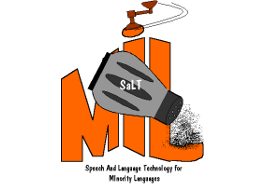- Home
- Activities
- Special Interest Groups
- Speech And Language Technology for Minority Languages - SALTMIL
Speech and Language Technology for Minority Languages (SaLTMIL)

Click here to visit the SIG website!
Aims. SaLTMIL has the overall aim of promoting research and development in the field of speech and language technology for lesser-used languages, particularly those of Europe. It has the following specific objectives: promoting conferences and workshops; promoting electronic discussion through the Internet (Web site, discussion list, etc); maintaining a database of active researchers; providing a channel of communication between minority language researchers and those active in speech and language technology in general.
Motivation. By definition, a minority language has a smaller resource base than the major languages. For some minority languages (those that are fighting for survival), there are not sufficient resources to support research and development in speech and language technology. This means that, in time, the language will fall even further behind the major languages and will be viewed as second-class and pre-technological, since all interaction with computers will need to take place in a major language. This is a critical factor in the survival of some languages. If minority languages die, then a valuable part of the world's cultural diversity will have been lost.Therefore support is necessary for research in speech and language technology for minority languages. It is probable that advances can be made by acting together that could not be made by any one language acting alone. In the case of certain minority languages, the state Government is not particularly sympathetic to their existence, and support must be found from outside or private agencies.To begin with, all that can be achieved is the sharing of information and the forming of a network of researchers. But it is hoped that this networking will form the seed-bed out of which will grow more substantial projects. The adoption of common standards and procedures (as proposed by the EAGLES project) will help to minimise costs and workload in research, and this can be promoted through a SIG network of the kind proposed.
Board. Elections have been organised for the SIG officers in 2013:
- Chairperson: Mikel Forcada (Departament de Llenguatges i Sistemes Informàtics, Universitat d'Alacant, Spain)
- Secretary: Francis Tyers (Departament de Llenguatges i Sistemes Informàtics, Universitat d'Alacant, Spain)
- ISCA liaison officer: Briony Williams (Language Technologies Unit, BangorUniversity, UK)
ISCA-supported events
- workshop at LREC 2012 (Istanbul, Turkey) "Language technology for normalisation of less-resourced languages", proceedings
- workshop at LREC 2010 (Malta) "Creation and use of basic lexical resources for less-resourced languages", proceedings
- workshop at SEPLN 2009 (Donostia-SanSebastian, Spain) "Information Retrieval and Information Extraction for Less Resourced Languages", proceedings
- workshop at LREC 2008 (Marrakech, Morocco) "Collaboration: interoperability between people in the creation of language resources for less-resourced languages", proceedings
Join the SIG
Discussion list
